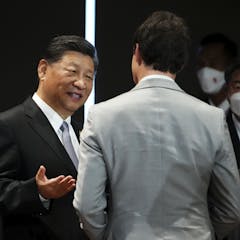
Articles on China-Canada relations
Displaying all articles

The perspectives of people from diaspora communities on how to stop foreign interference must be part of Canada’s electoral landscape so that Canadian democracy remains resilient.

With a public inquiry into Chinese interference about to begin, China may feature prominently in the Canadian news cycle in 2024 — meaning a genuine thaw in Canada-China relations isn’t in the cards.

A robust national security environment results in serious protocols and relationships for dealing with something as sensitive as the Michael Chong affair. It doesn’t currently exist in Ottawa.

Canada should examine Australia’s diplomacy-focused approach to China as it battles foreign interference.

Leaks about Chinese interference in Canadian elections isn’t just about politics — it’s also a deeply concerning national security crisis that raises questions about the legitimacy of our elections.

The federal government and Prime Minister Justin Trudeau are showing courage in standing up publicly to China. But words must be matched with serious action.

Xi Jinping thought he could chastise Justin Trudeau because this is the lesson the Jean Chrétien and Stephen Harper governments had conveyed: Don’t take us seriously when we talk about rights.

Did the U.S. cave to China’s exercise in hostage diplomacy when it signed a plea deal with a Huawei executive that resulted in freedom for the two Michaels? Or was it China that miscalculated badly?

The swiftness of the Chinese action to free the two Michaels signalled an important message to the world from the governing Chinese Communist Party: Don’t mess with us.

Canada is conspicuously absent from the new security pact signed between the U.S., the U.K. and Australia on China. Is it time for Canada to take a page from the Australian playbook on managing China?

Banning research ties with China, as Alberta just did, should be vetoed not only by the academic community but also the general public for its recklessness in fanning the flames of anti-Asian racism.

Improving the China-Canada diplomatic relationship is fraught with hurdles, but it’s not impossible. At minimum, we must understand the root cause of the problem from multiple vantage points.

Justin Trudeau’s government should assemble a strong, non-partisan China team led by the West to build a uniquely Canadian Asia strategy, with China at its core.

The place of Huawei in Canada’s 5G network, and the associated national security implications, will be a key issue for the next federal government.

Canadian beef and pork exporters have become increasingly reliant on China. That’s why the latest salvo in the Canada-China diplomatic dispute is so ominous for the agri-food sector.

In the absence of trust, greater cultural understanding is a powerful diplomatic tool and one that Canada needs to wield expertly when dealing with China.

Now is the time to give China the chance to show that while the Chinese justice system can mete out punishment, it can also exercise compassion and could spare the life of a Canadian drug smuggler.

China is influential, but would not have succeeded in changing the UN human rights system without quiet consent from countries who wished to trade with it, including Canada.

